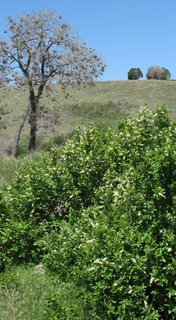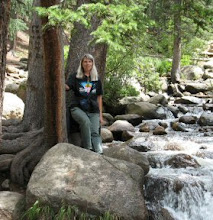 Many of our flowering foothills shrubs are in the Rose Family, and Chokecherry is among the most abundant. It's distinguished in the field by its elongated inflorescences and flowers that come after the leaves.
Many of our flowering foothills shrubs are in the Rose Family, and Chokecherry is among the most abundant. It's distinguished in the field by its elongated inflorescences and flowers that come after the leaves.Note that there's a honeybee nectaring on these fragrant flowers (and a smaller bee or wasp behind him waiting its turn). Honeybees are, of course, amazing pollinators, and not only produce honey for human (and bear) consumption, but also ensure the fruitfulness of many other crops. They are, in fact, domesticated servants of humans.
 Turns out, just around the corner from this bush is a bee tree. Don't think I'd noticed the hive in this hollow Hackberry before as I'm usually drawn to the witches' broom decorating its branches, but Bee Lady was with me and she pointed it out. The Hackberry is not dead-- yet! These trees are normally very late to leaf out, and it has been weakened considerably by the witches' broom.
Turns out, just around the corner from this bush is a bee tree. Don't think I'd noticed the hive in this hollow Hackberry before as I'm usually drawn to the witches' broom decorating its branches, but Bee Lady was with me and she pointed it out. The Hackberry is not dead-- yet! These trees are normally very late to leaf out, and it has been weakened considerably by the witches' broom.Looks like bee heaven to me-- a very short trip from a productive stand of Chokecherry to home and safety in the nearby tree. Foraging just a little further afield will enable these bees to find many more "roses" to pollinate. Our foothills shrubs surely benefit from all this attention!
[I have a nice picture of two bees heading into the tree home, but blogger insists on displaying it sideways. Sorry!]
Here's the rub (why must all our fine ecological stories seem to have a rub?): I learned, or was reminded, last week that our beloved honeybees were interlopers in this country, coming along with European settlers and even leading the way into the wilderness. It is said that the Amerindians were saddened when they saw the bees, because they knew the white man would soon follow.

2 comments:
Wow, Sally. I'd never have noticed the bee hive in that Hackberry, either. In fact, I'm not even sure I've found it yet. :-( But that's some infestation of witch's broom! I feel sorry for the tree. The bees will probably miss it, too, once it's gone.
Thanks, Mary... actually I think the bees left (or died) a year or so later-- but I should go check again. And see how the tree is doing too. We have a hackberry here at home that hasn't been discovered by the broom critters yet. Knock on wood. I think I feel a hackberry post coming on...
Post a Comment